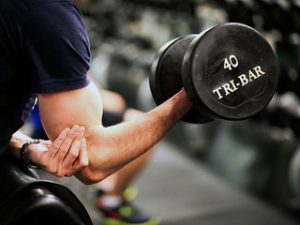Recognizing Muscle Dysmorphia (Bigorexia)
 Muscle dysmorphia, often called bigorexia or reverse anorexia, is an unhealthy preoccupation with muscularity or having big muscles.
Muscle dysmorphia, often called bigorexia or reverse anorexia, is an unhealthy preoccupation with muscularity or having big muscles.
Some mental health professionals consider it a type of body dysmorphic disorder (BDD) with a focus on muscularity.
BDD is defined in the psychiatric diagnostic manual as a preoccupation with a slight physical defect or with an imagined defect in appearance, causing the individual emotional distress and impairment in functioning.
People who have muscle dysmorphia see themselves as looking small or “puny” even though they typically appear normal or very muscular to others. To compensate for their perceived small appearance, a strict diet and strenuous workout schedule is maintained. Workouts are predominantly resistance training and weight lifting.
Both men and women can have muscle dysmorphia. But, as you might imagine, it is predominantly a male disorder.
Signs of Muscle Dysmorphia, or Bigorexia
- One of the constant concerns with muscle dysmorphia is body fat percentage, because muscles become more defined as the amount of body fat decreases.
- People with muscle dysmorphia may hide their physique with baggy clothing. Although it seems they would be proud of their looks, the opposite is true. Their body never looks “good enough” and is a source of shame.
- Workouts can take precedence over other significant events or time spent with family and friends. They may fear that missing one workout session will set them back or stymie progress, and they will workout even when injured.
- It is common for individuals with muscle dysmorphia to abuse anabolic steroids to enhance their appearance. The threat or appearance of enlarged breasts or shrinking testicles is overshadowed by the obsession to grow muscle.
- Missing a workout or eating a “forbidden” food item can trigger extreme anxiety and crush self-esteem. To counter the anxiety, an individual might add additional workout sessions, skip meals, or use some means to punish themselves for being a failure.
- Getting bigger is on their mind constantly. This includes thinking about diet, working out, or appearance.
- There are frequently accompanying symptoms of depression.
In one study, men diagnosed with BDD and who also had muscle dysmorphia were more likely to have attempted suicide, had a higher frequency of substance and steroid abuse, and had a poorer overall quality of life than those with BDD without muscle dysmorphia. Researchers theorize that the extreme dieting and exercise regimen of those with muscle dysmorphia compound the distress of their BDD symptoms.
Help Is Available
If you are concerned that someone you care about has this problem, you might convince them to at least be evaluated by a doctor. However, individuals with muscle dysmorphia often insist that they like themselves as they are. Their self-image of being too small is very real to them, and the idea of giving up the diet and exercise regimen, unacceptable.
For those with symptoms who do reach out for help, cognitive-behavioral therapy, sometimes supported with medication, has been successful in helping people loosen the grip of their obsession.
Know that seeing a therapist does not mean you have to give up your exercise or diet; that always remains your choice. Yet by speaking with someone, you open yourself to insights and awareness that may change your mind about the behavior, increasing your chances of good long-term health and well-being.
Source: National Institutes of Health
 Eating Disorder Self Test. Take the EAT-26 self test to see if you might have eating disorder symptoms that might require professional evaluation. All answers are confidential.
Eating Disorder Self Test. Take the EAT-26 self test to see if you might have eating disorder symptoms that might require professional evaluation. All answers are confidential.